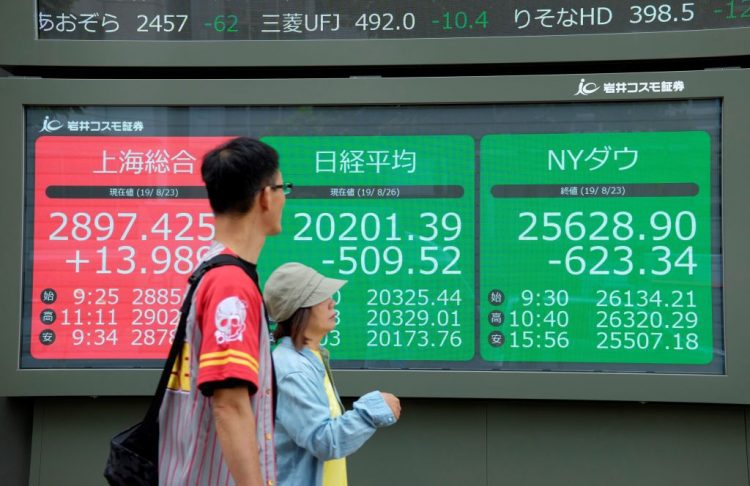Publisher: Maaal International Media Company
License: 465734
Asian shares rise in subdued holiday trading, as US futures jump
Asian shares advanced Thursday, with many markets in the region closed for Labor Day holidays, after U.S. stocks stormed back from steep early losses to a seventh straight day of gains, AP reported.
Uncertainty about what President Donald Trump’s trade war will do to the U.S. economy remains a key focus for investors.
Japan’s benchmark Nikkei 225 rose 0.9% to 36,359.24 after the Bank of Japan decided to keep its benchmark interest rate unchanged as worries continue to grow about the impact of Trump’s policies.
اقرأ المزيد
Australia’s S&P/ASX 200 edged up less than 0.1% to 8,137.40.
On Wednesday, the S&P 500 rose 0.1% to extend its winning streak to a seventh day, closing at 5,569.06. The Dow Jones Industrial Average added 0.3% to 40,669.36. The Nasdaq composite edged down by 0.1% to 17,446.34.
It was a stunning reversal after the S&P 500 dropped as much as 2.3% and the Dow fell 780 points in early trading. Stocks initially tumbled after a report suggested the U.S. economy may have shrunk at the start of the year, falling well short of economists’ expectations, in a sharp turnaround from the economy’s solid growth at the end of last year.
Importers rushed to bring products into the country before tariffs could raise their prices, which helped drag on the country’s overall gross domestic product.
Such data raised the threat of a worst-case scenario called “stagflation,” one where the economy stagnates yet inflation remains high. Economists fear it because the Federal Reserve has no good tools to fix both problems at the same time. If the Fed were to try to help one problem by adjusting interest rates, it would likely make the other worse.
Some better news came later in the day when a report said the measure of inflation that the Fed likes to use slowed in March. Inflation decelerated to 2.3%, closer to the Fed’s goal of 2%, from February’s reading of 2.7%. Stocks began paring their losses almost immediately after the report.
If inflation keeps trending lower, it would give the Fed more leeway to cut interest rates in order to juice the economy.
Much of Wednesday’s economic data raised concerns about a weakening economy. A report on the job market from ADP suggested employers outside the government may have hired far fewer workers in April than economists expected, less than half.
It’s discouraging because a relatively solid job market has been one of the linchpins keeping the U.S. economy stable. A more comprehensive report on the job market from the U.S. government will arrive on Friday.
Wednesday’s reports add to worries that Trump’s trade war may drag the U.S. economy into a recession. The president’s on-again-off-again rollout of tariffs has created deep uncertainty about what’s to come, which could cause damage by itself.
“I’m not taking a credit or discredit for the stock market,” Trump said Wednesday. “I’m just saying we inherited a mess.”
Uncertainty around Trump’s tariffs has already triggered historic swings for financial markets, from stocks to bonds to the value of the U.S. dollar, that battered investors through April. The S&P 500 briefly dropped nearly 20% below its all-time high set earlier this year, with scary headlines at one point warning of the potential for the worst April since the Great Depression.
The S&P 500 ended April with a decline of just 0.8%, much milder than March’s. It’s now 9.4% below its record.
In the bond market, Treasury yields fell as investors ratcheted up their expectations for cuts to interest rates by the Fed. The yield on the 10-year Treasury eased to 4.17% from 4.19% late Tuesday.
In other dealings early Thursday, U.S. benchmark crude shed 10 cents to $58.11 a barrel. Brent crude, the international standard gave up 5 cents to $61.01 a barrel.
The U.S. dollar rose to 143.88 Japanese yen from 143.06 yen. The euro cost $1.1308, down from $1.1331.








